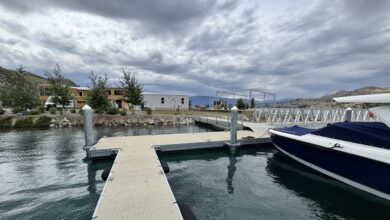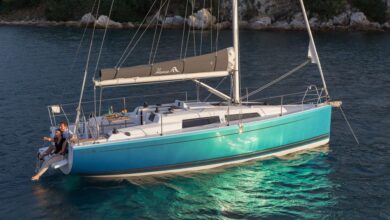Assurance policy
Everyone loves a good ‘a-ha’ moment. For Lauren Woodard-Splatt, general manager of Woodard Marine Inc. on Lake Bomoseen, Vt., it materialized during a February snowstorm, when representatives from Global Marine Insurance Agency turned up on her dealership’s doorstep and made an offer she couldn’t refuse.
“They showed up at exactly the right time,” says Woodard-Splatt, who runs the family-owned business with husband, Eric. “Just that morning, we were in a meeting and I was telling my father I had my million-dollar question: ‘How can we make more money without having to spend money?’.”
The answer literally came knocking. Global Marine representatives explained to her that providing insurance products to Woodard Marine customers could increase the dealership’s profits with no up-front capital investment. It was the “money for nothing” solution Woodard-Splatt eagerly sought. She touts the benefits of purchasing insurance through the dealership and fills out the necessary paperwork; in return, the dealership receives a percentage of insurance premiums and renewals on new boat sales and storage contracts sold by the agency to Woodard customers.
“The first time I did it, I thought, ‘That’s it? Are you sure?,’” Woodard-Splatt says. “It just fit perfectly into what we needed. If [a dealership] did not look in this direction, they’re really missing something.”
For marine dealerships across the country, consumer insurance products represent a profit center they can’t afford to ignore. Times are tough, and with new boat sales all but sunk, dealers should capitalize on every opportunity to bolster their bottom lines and keep customers satisfied and coming back for more. Understanding the benefits of offering insurance products and knowing what to look for when selecting an insurance partner are critical. But marine insurance veterans caution dealers to do their homework and make sure they know what they’re recommending or referring to ensure maximum profitability and success.
Income potential
The current economic recession has left many marine dealerships struggling to keep the doors open. In the wake of depressed new boat sales, leaving potential profits on the table isn’t an option, and providing consumer insurance through the dealership can help add necessary cash to the financial reserve.
“When boat sales were strong, [dealers] really didn’t understand the added value and it wasn’t on their radar,” explains Mike Smith, president of Global Marine Insurance Agency, a privately-owned, marine-specific firm headquartered in Traverse City, Mich. “We’ve had a lot more interest in the last couple of years.”
“A lot of dealers miss the boat,” echoes Jan Kelly, CEO of JL Kelly Inc., a full-service F&I and sales training/consulting firm for the recreational marine and RV industries in Vancouver, Wash.
Kelly, a 25-year industry veteran, has advised dealers for years to be sure they get a seat on the F&I gravy train because even in a tough economy, there’s money to be made in the insurance business. “When dealers start seeing the numbers that are possible, they think I’m full of beeswax,” she says. “Even if you have to hire and train an F&I manager, you’re going to be in the blue on the first or second deal. That’s how fast you can make your money back.”
Whether you bring on a professional, salaried F&I manager or choose to outsource the business, experts say there’s money to be made when dealerships provide insurance options to customers. “Prior to the downturn, we had dealers earning in excess of $100,000 per year just from boat and yacht insurance revenue,” says Joe Cecchini, CEO of Westmar Marine Insurance Agency in Stockton, Calif. Westmar has been in business for a quarter-century and specializes in working one-on-one with dealers, primarily those located in the western United States.
“Over time, it almost works like an annuity,” he continues. “For larger dealerships, it can create a sizeable income.”
Profits stemming from insurance products do vary. Still, whether in tough times or in prosperity, lining a dealership’s pockets with extra cash is a good thing. “We have dealerships that make anywhere from $500 per year to $100,000 a year,” says Matt Anderson, CFO and partner with Global Marine Insurance. “It’s just good business [for dealerships] to look at these type of opportunities.”
In the case of Woodard Marine, it didn’t take long before Woodard-Splatt realized the potential. Since every financed boat requires insurance, and most boats at Woodard Marine are financed purchases, it stood to reason the dealership had a golden opportunity to generate relatively significant income by offering insurance. In the first year, Woodard-Splatt figured if 50 percent of the dealership’s customers would buy insurance through Woodard Marine, the dealership could turn a $3,000 profit.
“This was a huge move for us,” she admits. “Most people budget to cut costs, not make money. We looked at it as a profit center during tough times.” And, she adds, “With no cost, you can’t say no to it.”
But the real profits come after the first year, Woodard-Splatt says. In 2010, if 100 percent of her original insurance clients renew their policies, that’s an automatic $3,000. Supposing she can add a percentage of new business to her existing base plus a portion of the dealership’s boat storage customers, Woodard Marine’s looking at a potential profit three times its initial 2009 take home, somewhere in the neighborhood of $10,000.
“It just keeps growing and growing,” she explains.
“It’s a science of little things,” echoes Kelly. “A little here, a little there and you could wind up making a whole lot. At the end of the year, F&I should equate to about three to six percent of a dealer’s sales volume.”
Already, Woodard-Splatt says her dealership is off to a running start. As the onsite, legally trained insurance professional (she did have to get state licensing by passing a test), Woodard-Splatt provides free insurance quotes to each of her customers. To date, her efforts have yielded a 95-percent close rate and stuffed extra money in Woodard Marine’s pockets.
Other advantages
Marine insurance veterans admit earning potential through the insurance sales and referral business varies from dealership to dealership based on sales volume and average premium size. However, experts maintain there are more significant advantages than financial incentive to offering consumer insurance products at the dealer level.
For Galati Yacht Sales — which currently operates eight dealership locations along the Gulf Coast, from Florida to Texas — offering insurance options to boat buyers is more about improving and enhancing the customer experience than financial gain.
“It’s very important to us that all products are offered to our customers so we can lower the cost of ownership,” explains Darren Plymale, Galati’s general manager. “Ninety-nine percent of the time, our programs are more competitive than [the competition]. Where we’ve really won is providing the most difficult [to insure] customer with an insurance product that works for them.”
Galati has its own branded insurance products through a partnership with Baldwin Connelly, a private risk management group headquartered in Tampa, Fla. Called Baldwin Connelly Galati Marine Solutions, the joint venture is managed in-house through Galati staff and underwritten by Baldwin Connelly. With high-dollar boat sales like those Galati generates (the average dealership sale is approximately $1 million) come high-dollar premiums. These elevated premiums, Plymale says, caught the attention of Baldwin Connelly and eventually led to the partnership formation.
“It’s not so much the revenue the dealers can make; what’s important is that having a specialized insurance product?helps?[dealerships]?sell?boats,”?explains?Cecchini?Offering insurance products to customers can actually help dealerships close transactions.
Maintaining control over insurance contracts also helps dealerships build closer relationships with their customers,?says?Mike?Garner, Westmar’s vice president of field sales. “A lot of dealers forget about that,” he points out. “They just sell the boat and that’s it.”
Finding the right partner
Once a dealership decides to offer boat insurance to its customers, the question then becomes: how?
Many marine dealerships elect to partner with an agency as opposed to having an in-house F&I manager. The dealers refer customers to the agency, and the agency sells that customer the actual policy.
“We are a one-stop-shop for dealers as well as the customer,” says Lorraine Mariotti, vice president of lending for Priority One Financial Services in St. Petersburg, Fla. Priority One has specialized in providing F&I solutions for?hundreds?of?marine?and?RV?dealers?across the country since the mid-80s.
Mariotti says that when selecting an insurance partner, dealers should look for one that is backed by an insurance company and be sure to choose an agency that’s connected with well-known lenders, offering well-known products.
Experts also recommend dealerships seek out insurance partners specializing in the marine industry. Local agents are often unfamiliar with boats, and their lack of understanding related to marine-specific coverage can sometimes put a wrench in the sale.
“Dealers can get sideways on a deal,” Global Marine’s Smith cautions. “If the agency is generalist, that’s probably not the best choice.” He and Anderson advise dealerships to choose an agency that offers marine insurance as its primary line of business.
“There are a lot of nuances our industry provides that are outside of home or auto insurance that anyone you partner with really needs to understand,” echoes Plymale.
Check out the general reputation of the agency, Cecchini recommends, and know which insurance companies they work with. It’s completely reasonable for a dealership to ask if it can review policies being issued by the agency and request professional references.
“I think that’s essential,” he says. “We can’t afford to be selling a stripped down policy. We’re providing [a dealership’s customers] with a Cadillac policy at a competitive price.”
As part of the due diligence process, Anderson suggests dealerships look into the professional ratings of insurance companies and avoid selecting those aligned with sub-par underwriters. “Some companies that are less than A-rated will write insurance for boats, and you don’t want to do business with those agents,” he cautions.
Dealerships need to confirm a potential insurance partner can accommodate their full range of inventory, regardless of size. “We handle every class of watercraft from jet skis to megayachts,” Cecchini says.
Insurance partners should also be available the same hours a dealership is selling boats, including Saturdays and Sundays. Global Marine and Westmar agents make themselves available on weekends to ensure dealerships can get customer quotes when they need them.
In addition, Westmar offers its Fast Fax form, which a dealership can fill out and fax to the company along with the purchase order for a quote or to bind coverage. If it is to bind coverage, as soon as it’s received, coverage is bound, no matter what time of day. The company’s underwriters then run it through the Department of Motor Vehicles and contact the customer to review coverage and payment options. Within 5 to 7 days, the customer receives their policy in the mail.
“Any delay in the process poses a risk to the dealer,” explains Smith.
Always ask for a certificate of insurance from a potential vendor, Kelly insists. Often a dealer will remember to ask for it the first time around but forget to request copies on an ongoing basis. “This is an annual drill,” she says. “[Dealers] need to ask for it every year.”
Whoever holds responsibility for insurance inquiries at the dealership should not only be properly licensed, but also well versed in the available products. “A lot of times, dealers just hand [customers] a brochure,” Mariotti points out. “If they don’t know the product well enough themselves, they won’t be able to sell it.”
And Kelly believes that’s precisely why it’s important for dealerships to have a dedicated professional on staff charged with handling the insurance side of the business. “Too many dealers have the owner’s secretary as the financial manager,” she says. “They don’t make the time to sell because they’re not salespeople.”
Instead of outsourcing their insurance business, Kelly advocates dealerships hire an internal F&I manager. Yes, the position will set you back another salary, but she argues keeping the job in-house means dealerships retain all profits stemming from insurance sales. When dealers agree to work with agencies or outsource the job, they only make a percentage, which Kelly says is typically in the 30- to 50-percent range.
Whatever avenue a dealership chooses to pursue — hiring an internal F&I manager or outsourcing the business to a seasoned, reputable agency — experts say dealers shouldn’t let potential profits slip through their fingers.
“Every dealer is doing something,” Cecchini says. “That business is going somewhere.”




